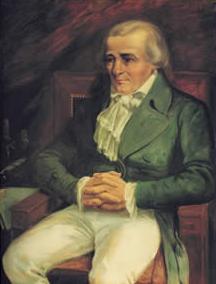Juan Germán Roscio facts for kids
Quick facts for kids
Juan Germán Roscio
|
|
|---|---|
 |
|
| 1st Minister of Foreign Affairs of Venezuela | |
| In office 25 April 1810 – 2 March 1811 |
|
| President | Cristóbal Mendoza |
| Succeeded by | Pedro Gual |
| Vice President of Gran Colombia | |
| In office 21 March 1820 – 10 March 1821 |
|
| President | Simón Bolívar |
| Member of the Congress of Angostura | |
| Personal details | |
| Born | 27 May 1763 San José de Tiznados, Province of Venezuela |
| Died | 10 March 1821 (aged 57) Cúcuta, Gran Colombia |
| Profession | Lawyer, politician |
| Signature |  |
Juan Germán Roscio (born May 27, 1763 – died March 10, 1821) was an important Venezuelan lawyer and politician. He played a key role in Venezuela's fight for independence from Spain.
Roscio served as the first foreign minister of Venezuela. He was also a leader during the First Republic of Venezuela. He helped create the country's first newspaper, Gazeta de Caracas, and later Correo del Orinoco. He was the main person who wrote the Venezuelan Declaration of Independence. He also helped write the first Venezuelan Constitution in 1811. Later, he became president of the Angostura Congress and vice president of Gran Colombia.
Contents
Early Life and Education
Juan Germán Roscio was born in San José de Tiznados, Venezuela. His father, Giovanni Roscio, was from Milan, Italy. His mother, Paula María Nieves, was a Venezuelan native.
He learned Italian and Latin in his hometown. In 1774, he moved to Caracas to continue his studies. He studied theology and law. He earned degrees in church law (Canon law) in 1794 and civil law in 1800.
After finishing his studies, Roscio wanted to become a lawyer. However, the College of Law tried to stop him. They said he couldn't be a lawyer because of his mother's background. Roscio fought this unfair decision for nine years. He eventually won and was allowed to practice law. Because of this, he is seen as an early champion of civil rights and fighting against discrimination.
Roscio married María Dolores Cuevas from Guyana. They had one daughter, Carmen Roscio Cuevas, who was born on March 10, 1821.
Public Service and Independence
Juan Germán Roscio was a major thinker behind Venezuela's independence movement. He was a leader in the revolution that started on April 19, 1810. He worked as the foreign minister for the first independent government, called the Supreme Junta. During this time, he strongly supported Venezuela becoming a free nation.
He was a representative for Calabozo at the Constitutional Congress of 1811. He helped write the Declaration of Independence, which was signed on July 5, 1811. He also helped create the 1811 Federal Constitution.
In August 1810, Roscio started the Sociedad Patriótica (Patriotic Society). Important figures like Francisco de Miranda and Simón Bolívar attended its meetings. Bolívar gave a famous speech there, saying, "Perhaps 300 years of calm are not enough."
In March 1812, Roscio was chosen as a member of the three-person ruling group (triumvirate). He supported making Miranda the top general and leader of Venezuela.
Imprisonment and Later Years
After the First Republic of Venezuela was defeated, Roscio was captured. He was sent to jail in Spain, first in the Arsenal de la Carraca and then in Ceuta. He was held with seven other Venezuelan leaders.
In 1814, Roscio and three others managed to escape to Gibraltar. However, British authorities sent them back to Spain. Roscio's friend, Thomas Richard, sent a letter to King George IV of Britain. This letter helped convince King Fernando VII of Spain to release the four prisoners.
After his release, Roscio traveled to Jamaica and then to the United States. In 1817, he published a book called Triunfo de la libertad sobre el despotismo (Triumph of Liberty over Despotism) in Philadelphia.
In 1818, he joined Simón Bolívar in Angostura. He helped Bolívar create the Third Republic of Venezuela and later Gran Colombia. During this time, Roscio served as finance minister and president of the Angostura Congress. He also became vice president of the Department of Venezuela and Gran Colombia.
Juan Germán Roscio passed away on March 10, 1821, just before he was supposed to lead the Cúcuta Congress.
Roscio was also involved in creating paper money for Venezuela. He suggested the name "Bolívar" for the currency, which is still used today. He was a founding member and second director of the Orinoco Mail newspaper. He also pushed for the creation of a national library.
In 2011, it was decided that his remains should be placed in the National Pantheon of Venezuela. This is a special place where important Venezuelan heroes are buried. However, finding and identifying his exact remains has been difficult.
Images for kids
See also
 In Spanish: Juan Germán Roscio para niños
In Spanish: Juan Germán Roscio para niños
 | Chris Smalls |
 | Fred Hampton |
 | Ralph Abernathy |


